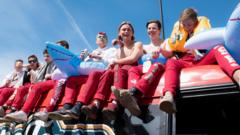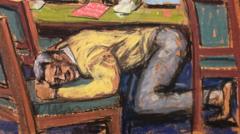As Norway's graduation season approaches, a tradition marked by exuberant celebrations has evolved into a contentious cultural phenomenon. Dubbed "russ," school leavers don red overalls and embark on party-filled excursions in specially rented buses known as "russebuss," often weeks before their final exams. While these festivities symbolizing freedom and fun have long been cherished, rising concerns over safety, excessive drinking, and financial burdens on students have prompted a governmental intervention aimed at reining in the celebrations.
School Leavers Take to the Buses, Sparking Concerns in Norway

School Leavers Take to the Buses, Sparking Concerns in Norway
Norwegian youth's extravagant celebratory culture raises alarms for education and safety amid party frenzy.
Norwegian school leavers partying in red overalls is a familiar sight as they approach their national day on 17 May. Selma Jenvin-Steinsvag and her classmate Aksel hurried down to catch the Oslo metro, looking forward to the fun-filled weeks that lie ahead, where their written exams will soon be a thing of the past. The "russ" is symbolic of their transition into adulthood, and while it traditionally culminates on the national day, many have begun celebrating earlier, initiating weeks of partying before their exams have concluded.
Among the most striking manifestations of this annual revelry is the russebuss, party buses that have become a staple of the graduation experience. "It's a party bus! We go out every night for a month, we get drunk, we're partying with our friends and it's just fun!" exclaimed 19-year-old Edvard Aanestad, illustrating the carefree essence of the festivities. However, this jubilant atmosphere has raised alarms among parents, educators, and even government officials, who worry that the excessive partying, mounting peer pressure, and sleepless nights negatively impact the youth's wellbeing and academic performance.
Renting these party buses is no small feat; many students go into debt to secure a spot. An astonishing amount of money is devoted to the festivities, with some bus groups racking up budgets reaching up to £220,000. The financial strain leads many to resort to odd jobs, often selling items like toilet paper to help fund their celebrations.
In light of the growing concerns surrounding the russet festivities, Prime Minister Jonas Gahr Store expressed his worries, acknowledging his own joyful graduation experience while noting that the russebus culture has spiraled beyond control. Parents like Solveig Haukenes Aase are also voicing concerns, with some forming advocacy groups to create safer environments for their children. The consensus among educators and decision-makers is that the intertwined relationship between the celebrations and exam periods is detrimental — both to students' focus and overall academic results.
Named to address these issues, Norway's Minister of Education noted the increasing exclusivity and commercialization of the celebrations, acknowledging their adverse effects on students as young as those in lower secondary schools. Plans are underway to restructure the celebrations to occur once exams are concluded, offering a more inclusive experience for all students.
With roots dating back to the early 1980s, the russebuss phenomenon has evolved from an intimate affair among classmates to a nationwide trend. Ivar Brandvol, who has studied the developments, noted that the definition of these celebrations has shifted, resulting in a widened divide between bus groups. A push for increased safety measures has emerged, with Minister of Transport Jon-Ivar Nygard stressing the necessity to discontinue the use of converted buses equipped with sideways seating.
However, the sentiment among many school leavers suggests the government’s plans may not adequately address the issues at hand. Students like Edvard argue that banning certain bus styles may reduce inclusivity instead of fostering it. As graduation day draws near, a significant conversation unfolds about ideal methods to uphold traditional celebrations while ensuring the safety and wellbeing of Norway's youth.
Among the most striking manifestations of this annual revelry is the russebuss, party buses that have become a staple of the graduation experience. "It's a party bus! We go out every night for a month, we get drunk, we're partying with our friends and it's just fun!" exclaimed 19-year-old Edvard Aanestad, illustrating the carefree essence of the festivities. However, this jubilant atmosphere has raised alarms among parents, educators, and even government officials, who worry that the excessive partying, mounting peer pressure, and sleepless nights negatively impact the youth's wellbeing and academic performance.
Renting these party buses is no small feat; many students go into debt to secure a spot. An astonishing amount of money is devoted to the festivities, with some bus groups racking up budgets reaching up to £220,000. The financial strain leads many to resort to odd jobs, often selling items like toilet paper to help fund their celebrations.
In light of the growing concerns surrounding the russet festivities, Prime Minister Jonas Gahr Store expressed his worries, acknowledging his own joyful graduation experience while noting that the russebus culture has spiraled beyond control. Parents like Solveig Haukenes Aase are also voicing concerns, with some forming advocacy groups to create safer environments for their children. The consensus among educators and decision-makers is that the intertwined relationship between the celebrations and exam periods is detrimental — both to students' focus and overall academic results.
Named to address these issues, Norway's Minister of Education noted the increasing exclusivity and commercialization of the celebrations, acknowledging their adverse effects on students as young as those in lower secondary schools. Plans are underway to restructure the celebrations to occur once exams are concluded, offering a more inclusive experience for all students.
With roots dating back to the early 1980s, the russebuss phenomenon has evolved from an intimate affair among classmates to a nationwide trend. Ivar Brandvol, who has studied the developments, noted that the definition of these celebrations has shifted, resulting in a widened divide between bus groups. A push for increased safety measures has emerged, with Minister of Transport Jon-Ivar Nygard stressing the necessity to discontinue the use of converted buses equipped with sideways seating.
However, the sentiment among many school leavers suggests the government’s plans may not adequately address the issues at hand. Students like Edvard argue that banning certain bus styles may reduce inclusivity instead of fostering it. As graduation day draws near, a significant conversation unfolds about ideal methods to uphold traditional celebrations while ensuring the safety and wellbeing of Norway's youth.





















